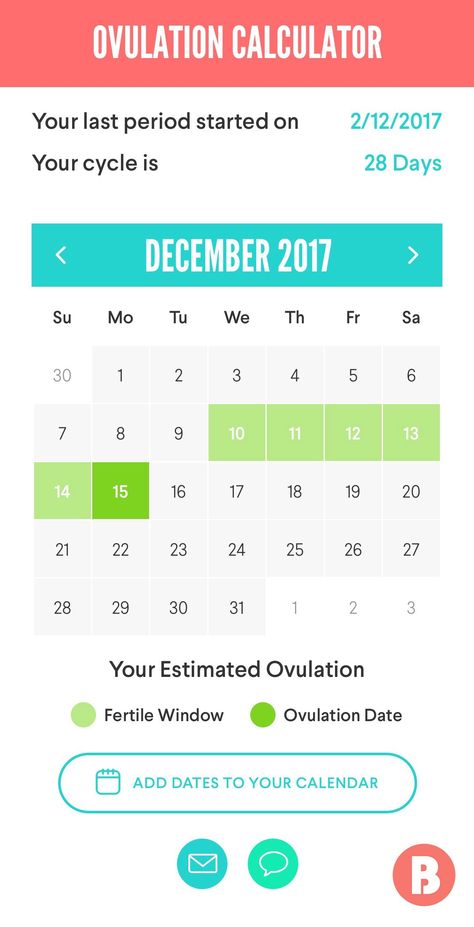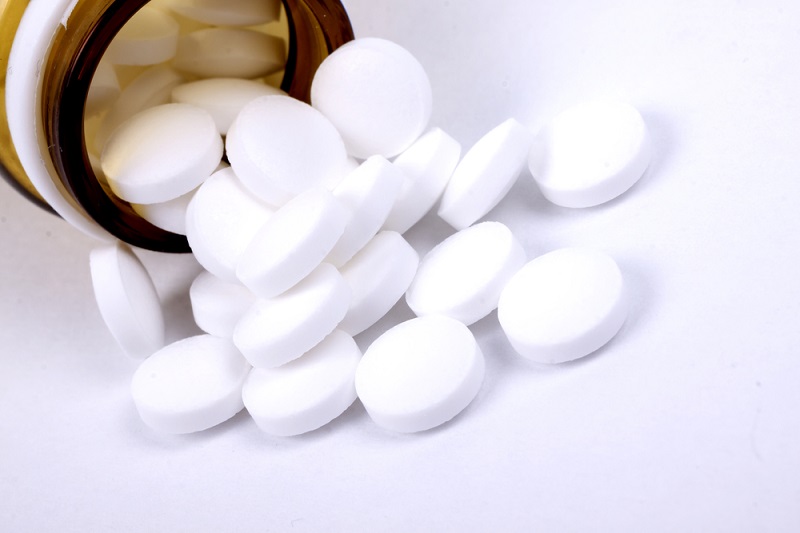Painful bladder during pregnancy
Bladder Pain During Pregnancy: Causes & Treatments
Is your bladder feeling the pressures of pregnancy? Are you unsure what’s causing the pain and worried it might be serious?
I’ve had countless women in my practice ask me questions about bladder pain during pregnancy. As it’s such a common issue, we’ve decided to dive into the causes and offer some remedies for bladder pain.
We’ll discuss everything related to the bladder and pregnancy and do our best to help you find some relief from any pain or discomfort you may be dealing with.
Table of Contents
- Bladder Changes During Pregnancy
- Possible Causes of Bladder Pain
- Other Ways to Ease Bladder Pain
- In Conclusion
Bladder Changes During Pregnancy
The bladder is probably one of the most vulnerable organs during pregnancy. Over the nine months of gestation, it goes through many changes.
Your kidneys suddenly expand due to hormones, causing an overproduction of urine that the bladder must get rid of. Additionally, your baby will continue to grow, putting further pressure on the already stretched organ.
Let’s take a closer look at how these changes occur throughout pregnancy:
1. First Trimester
I don’t know about you, but my bladder was acting up even before the positive test. I had to pee like crazy! This was the first indication that led me to buy a pregnancy test, and I know I’m not alone here.
Frequent urination is often one of the first hints of pregnancy. From the moment of fertilization, a wave of hormones floods the kidneys, increasing urine production (1).
But your uterus also begins to expand, even though your baby is still only the size of a speck. This extra pressure from the uterus on your bladder makes you visit the bathroom more often.
2. Second Trimester
Typically, when we reach the second trimester, everything tends to slow down. Our bellies are still growing, and the baby is still developing. But it gets less intense.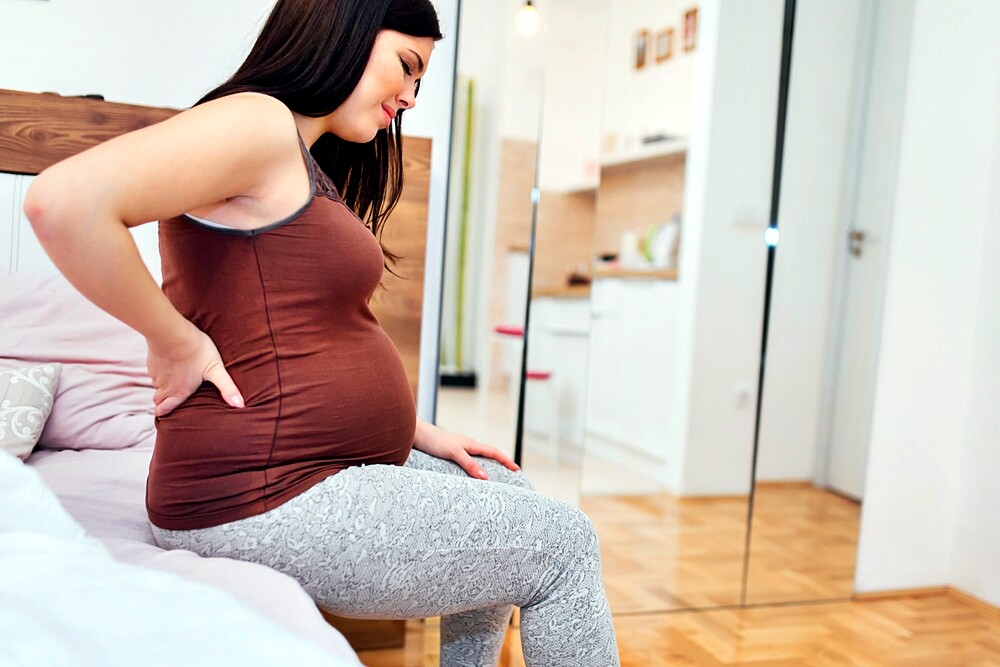 Morning sickness will likely subside, and you may finally be able to eat without feeling nauseous.
Morning sickness will likely subside, and you may finally be able to eat without feeling nauseous.
The same goes for your bladder and urine production. During these few weeks, they’re given a well-earned break before the last, and probably most demanding, trimester.
3. Third Trimester
When we reach the third trimester of pregnancy, the discomfort from the first few months greets us again. The frequent urge to go will come calling again.
Additionally, the baby is now much larger, putting even more pressure on the pelvis and bladder. Unfortunately, for some women, this gets worse during the night when they’re lying down.
Fluid is essential, and you should increase your intake during pregnancy. While waking up frequently to relieve yourself may be good practice for when the baby arrives, you need your rest. This is why medical providers recommend reducing your intake of fluids a couple of hours before bed.
Possible Causes of Bladder Pain
Some expectant moms may feel actual pain in the bladder, not just pressure.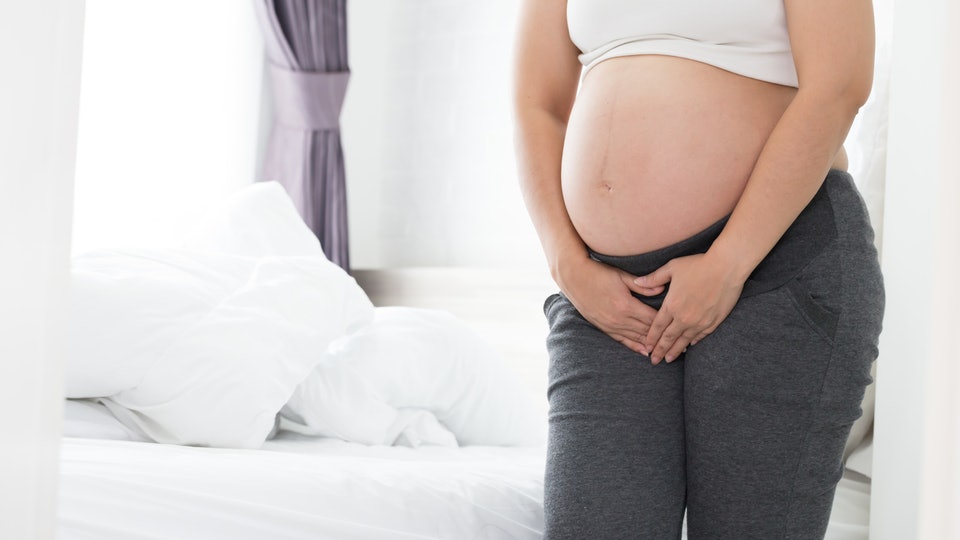 This discomfort is due to more than your baby using it as a pillow. A few things can cause pain in the bladder during pregnancy.
This discomfort is due to more than your baby using it as a pillow. A few things can cause pain in the bladder during pregnancy.
1. Increased Urine Production
This might be the most straightforward reason you feel pressure on your bladder. For some women, however, this causes pain rather than just pressure.
During pregnancy, our body begins to increase the production of hormones. These hormones increase the volume and speed of blood streaming through your body.
Toward the end of the pregnancy, your body is circulating up to 50% more blood than before you were pregnant.
Your kidneys have to process the extra fluid from this blood flow, which results in your bladder filling up more quickly, causing a frequent need to urinate (2).
This generally becomes an issue during the last few months, when the uterus takes up so much space. Before pregnancy, your uterus was the size of an orange. During the nine months of gestation, it grows to be the size of a watermelon!
Imagine the pressure that this, plus a rapidly growing fetus, is putting on your bladder.
How to Minimize Urine Production
Having constant pressure on your bladder can be very irritating and painful, especially when it’s full more often. Luckily, there are ways you can minimize this.
Avoid certain beverages such as coffee, soda, and juice. You can have them once in a while if you must (we all get cravings), but keep them to a minimum. These drinks are diuretics and will increase urine production (3).
However, never reduce your intake of water. Pregnancy makes us susceptible to dehydration, which can cause an array of issues for you and your baby. Be sure you drink eight to 10 glasses of water each day.
Make sure you fully empty your bladder by leaning forward when you pee. Push it all out, mama! And lastly, don’t hold it — when you gotta go, you gotta go.
2. Urinary Tract Infection (UTI)
This is also a common cause of bladder pain during pregnancy. A UTI is the result of a bacterial inflammation in the urinary tract (4).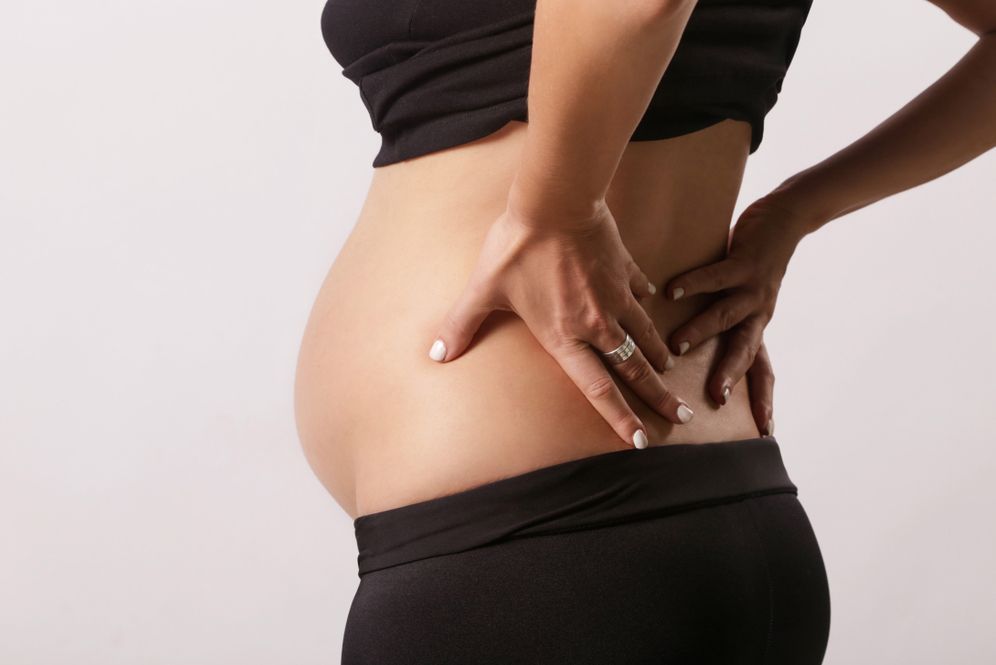
A UTI can occur anytime; however, it’s most common between the 6th and 24th weeks of pregnancy. It generally happens because the growing uterus is putting pressure on the bladder. This causes a blockage of the urine from the bladder to the urinary tract, trapping the urine and causing an infection.
Generally, a UTI occurs during pregnancy due to an otherwise benign bacteria called Escherichia coli. However, sometimes the infection can have a more notorious culprit, namely a bacterium called Group B strep (GBS) or a condition called pyelonephritis.
GBS causes a more severe form of a UTI. Those affected require oral and intravenous antibiotics during pregnancy and labor. If left untreated, it could make you and your baby severely ill (5).
Pyelonephritis is an acute kidney inflammation caused by a UTI. This condition also requires intensive treatment. Without treatment, it could lead to sepsis or kidney failure.
If doctors suspect the possibility of acquiring a UTI during pregnancy, they’ll usually order some tests to determine which treatment is necessary.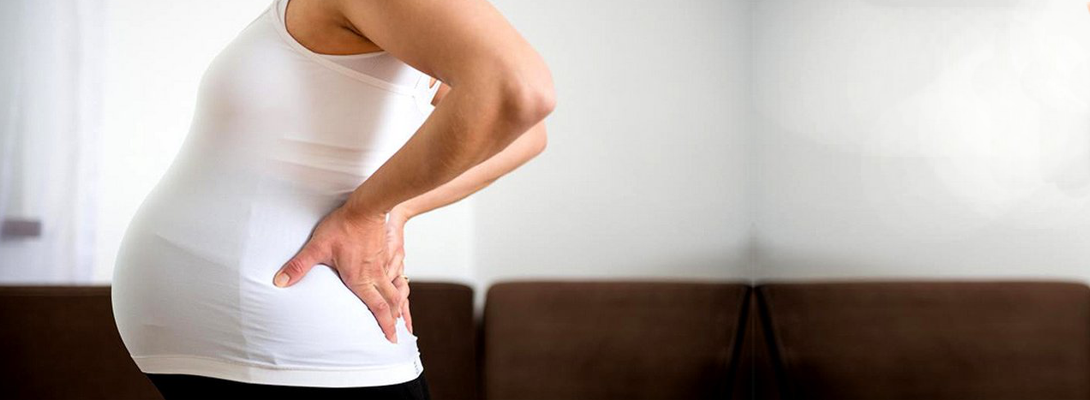
Signs of a UTI
- Burning or pain while urinating.
- Increased need to urinate and a sense of urgency.
- Traces of mucus or blood in the urine.
- Cramps or pain below the belly button.
- Fever symptoms — including chills and sweats.
If you leave the UTI untreated, it could lead to a kidney infection. This will cause back pain, chills, nausea, and fever.
An untreated kidney infection can eventually cause early labor or low birth weight in your baby — it could even be life-threatening for you and your baby.
UTI Treatment During Pregnancy
Health care providers generally treat UTIs with a course of antibiotics. If a bacterium caused your infection, treatment usually works quickly. Your health care provider will likely prescribe a three- to seven-day course of antibiotics.
The medicine provided is safe for you and your baby if you take it as prescribed. Finish the course and consult your doctor if symptoms don’t subside within three to four days.
Finish the course and consult your doctor if symptoms don’t subside within three to four days.
Contact your physician immediately if you begin to experience fever, chills, sweats, and nausea.
Urinary Stasis
Urinary stasis is a common condition occurring during pregnancy. This ailment hinders the bladder from emptying completely, generally due to a blockage of some kind.
Pregnant women are especially prone to this condition because the growing uterus blocks the natural urine flow.
To check for this condition, your doctor may take a urine culture. This will probably become a part of your regular checkups since urinary stasis is also known to cause UTIs and vice versa (6).
Symptoms of Urinary Stasis
- Inability to urinate.
- Feeling an urgent but painful need to urinate.
- Pain in the lower abdomen.
- Bloating in the lower belly (this may not be noticeable later in pregnancy).
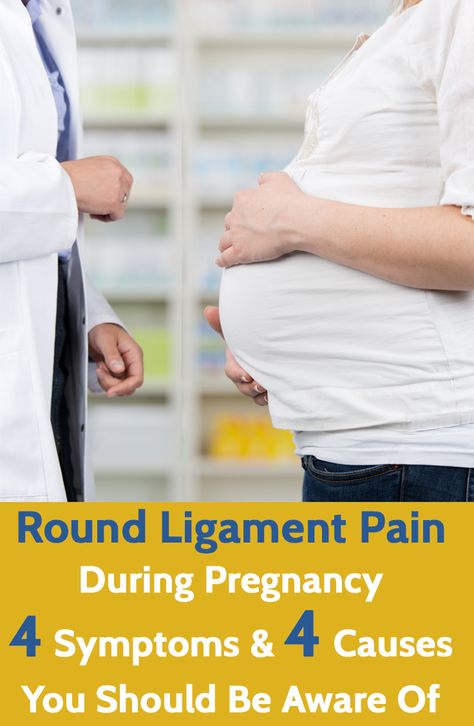
- Increased contractions or cramping (second or third trimester).
Doctors usually diagnose urinary stasis with a physical examination and a postvoid residual measurement (PVR). This is where your physician will see how much urine is still in your bladder after you attempt to urinate. Doctors generally do this by performing an ultrasound scan (7).
Treatment for Urinary Stasis
Doctors usually treat it with antibacterial drugs such as cephalexin, nitrofurantoin, or trimethoprim/sulfamethoxazole. Early intervention and treatment are required. If left without treatment, it could cause bladder or kidney damage.
Other Ways to Ease Bladder Pain
You’ll need prescription medication if a UTI or urinary stasis is causing your bladder pain.
But your discomfort could be just another uncomfortable symptom of pregnancy. You may be happy to hear that there is a beneficial tool you can use — a maternity support belt.
This is an excellent tool to support your growing belly.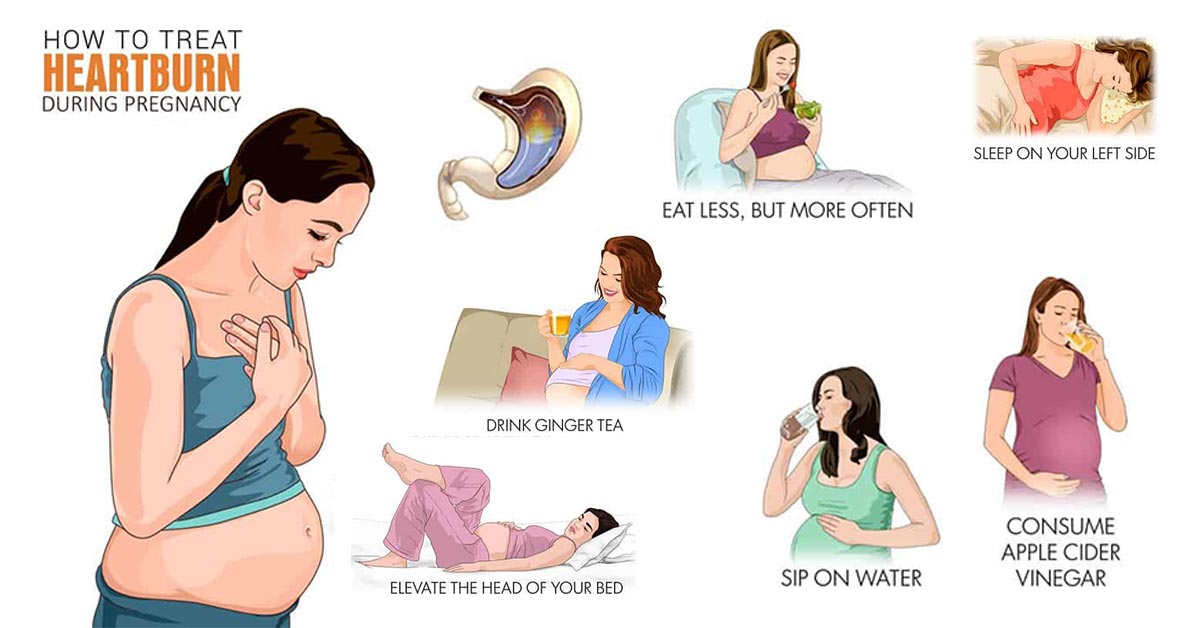 It will take some pressure off your bladder by elevating your bump. It was something magical I discovered in my second pregnancy, and I’m so glad I did.
It will take some pressure off your bladder by elevating your bump. It was something magical I discovered in my second pregnancy, and I’m so glad I did.
In Conclusion
Bladder health is vital, and bacteria will run wild if left unchecked. Wear loose-fitting clothing and cotton underwear, and avoid scented soaps or douches. Urinate after sexual intercourse, and change out of wet clothing, such as swimsuits or exercise gear, as soon as possible.
Editor's Note:
Caitlin Goodwin, MSN, RN, CNM
It’s normal to feel some pressure or pain in or near the bladder at some point during pregnancy. For some women, it’s merely due to a growing uterus and will subside without needing further treatment.
However, it sometimes occurs due to a urinary infection (UTI) or urinary stasis. These conditions require treatment with a course of antibiotics or antibacterial drugs.
Medication is necessary since one infection can lead to another and eventually cause serious complications.
Feedback: Was This Article Helpful?
Thank You For Your Feedback!
Thank You For Your Feedback!
What Did You Like?
What Went Wrong?
Causes of Painful Urination During Pregnancy
During pregnancy, it’s very normal to need to use the restroom many, many times a day. In fact, you’ll probably experience frequent urination almost from the very beginning of your pregnancy—but that doesn’t mean it should be painful. We can all agree that there isn’t a lot that’s super-comfortable while expecting, but painful urination during pregnancy could signal a problem. Luckily, it’s a pretty easy fix, especially if your pain when peeing during pregnancy points to a urinary tract infection (which up to 7 percent of pregnant women experience). Keep reading to learn everything you need to know about painful urination during pregnancy, including why it happens, what the hidden cause is and how to handle it.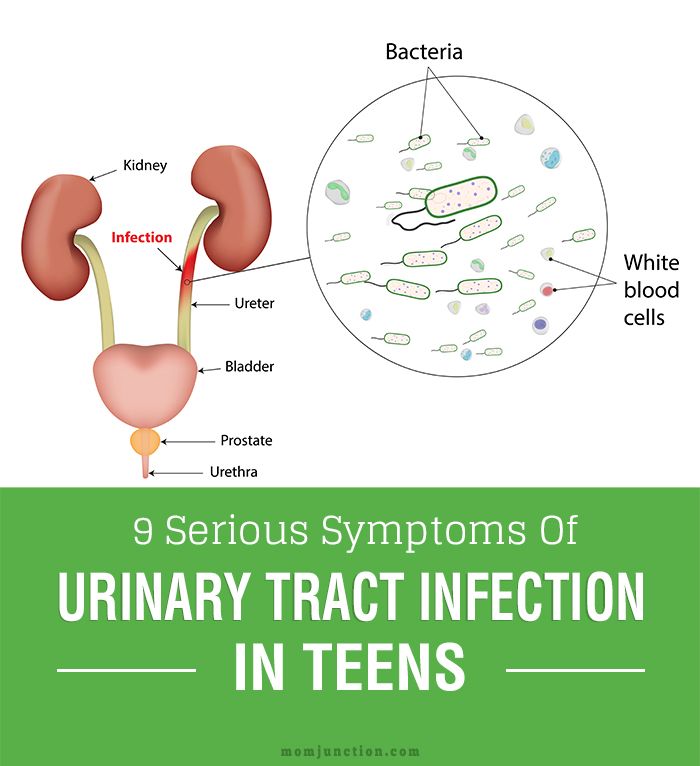
In this article:
What causes painful urination during pregnancy?
Is painful urination during pregnancy ever dangerous?
How to treat painful urination during pregnancy
How to prevent painful urination during pregnancy
What Causes Painful Urination During Pregnancy?
When it comes to peeing during pregnancy, frequent is fine—but pain is a problem. “Urination should never be painful,” says Sarah Prager, MD, a professor in the department of obstetrics and gynecology at the University of Washington. While there are a number of causes related to pain when peeing while pregnant, the most common by far is a urinary tract infection (UTI). “UTIs are more common during pregnancy due to both hormonal changes causing the urinary tract to relax, as well as mechanical changes caused by the enlarging uterus,” says Alan Fishman, MD, a maternal-fetal medicine specialist with Obstetrix Medical Group of San Jose in California.
If you’re experiencing painful urination during pregnancy, know that the following conditions can lead to a UTI, or they can be an underlying cause of bladder pain and painful urination during pregnancy.
Bacterial vaginosis
Bacterial vaginosis is a common condition caused by an imbalance in the normal bacteria that lives in the vagina. It can cause painful urination due to inflammation of the immediate area, or by spilling bacteria into the urinary tract, which can lead to a UTI.
Sexually transmitted infections
Any undiagnosed sexually transmitted infections can cause painful urination during pregnancy as a result of inflammation. “STIs can cause pain, usually pelvic but sometimes vaginal, or even painful urination. This is why pregnant women are screened for STIs at the beginning of pregnancy,” says Fishman.
Genital herpes
Herpes can cause painful urination, whether you’re pregnant or not. But unfortunately, this painful condition can cause extra complications during pregnancy. If you know you have herpes, it’s critical to follow your doctor’s advice in order to keep active infections at bay, especially as you approach your due date.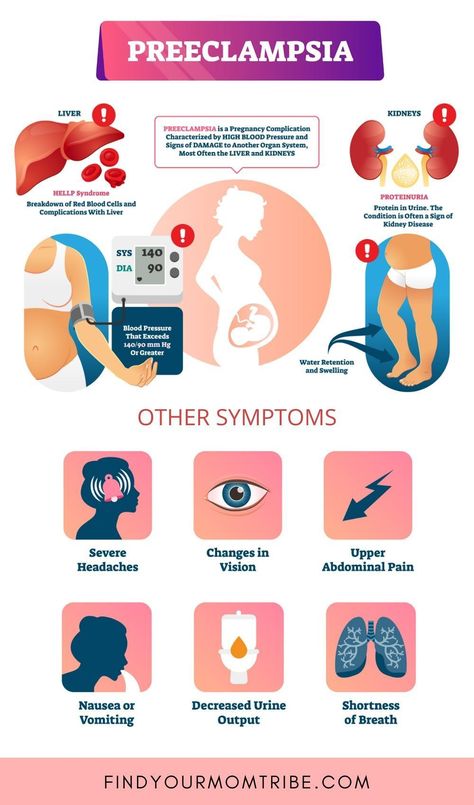
Mechanical obstruction
As your uterus grows to several times its normal size during pregnancy, it can put a (literal) squeeze on everything else in there. That includes the ureters, which are the ducts from the kidney to the bladder that urine passes through, says Brittany Robles, MD, an ob-gyn who runs PostpartumTrainer.com, a pregnancy and postpartum health and fitness site. When urine gets left behind in the ureters because it’s physically difficult to properly empty them, “this causes a condition known as urostasis,” Robles says. “That can lead to persistent bacterial growth and ultimately a urinary tract infection.”
Is Painful Urination During Pregnancy Ever Dangerous?
Pain when peeing while pregnant isn’t normal and usually points to a problem. It’s important to see your doctor if you’re experiencing either painful urination or bladder pain during pregnancy. The underlying problems are usually quickly resolved with treatment, but if left untreated they can become dangerous for you and baby.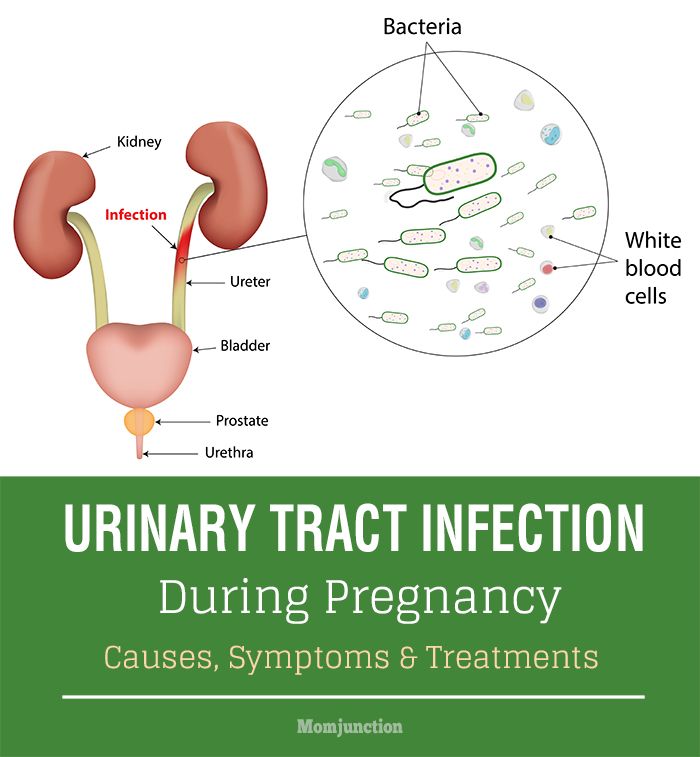 “Untreated urinary tract infections are associated with pregnancy complications such as preterm labor and preterm delivery. They can also cause kidney damage or sepsis in pregnant women,” says Fishman.
“Untreated urinary tract infections are associated with pregnancy complications such as preterm labor and preterm delivery. They can also cause kidney damage or sepsis in pregnant women,” says Fishman.
If it’s an undiagnosed or untreated STI that’s causing your painful urination, that can also be harmful to both you and baby. According to the CDC, if left untreated, chlamydia and gonorrhea during pregnancy can cause preterm labor, low birth weight and have been linked to miscarriage. They can also be passed onto baby at birth through the birth canal, potentially resulting in eye and lung infections. While this all sounds scary, rest assured that if you alert your doctor to any painful urination during pregnancy in a timely manner, the problem can generally be quickly and safely resolved.
How to Treat Painful Urination During Pregnancy
See your doctor at the first sign of painful urination, Prager says. Your doctor will probably prescribe antibiotics, especially if it turns out you have a UTI. The reason? “UTIs can become kidney infections or worse, so we’re relatively aggressive about treating them during pregnancy,” Prager says.
The reason? “UTIs can become kidney infections or worse, so we’re relatively aggressive about treating them during pregnancy,” Prager says.
This is likely also the same course of action your doctor will take if it turns out you have an STI: antibiotics can clear up many infections pretty quickly, so don’t be embarrassed about speaking up. After all, nothing is more important than your health and baby’s!
How to Prevent Painful Urination During Pregnancy
Pregnancy brings many aches and pains, and you likely don’t want to add pain when peeing to the list. So how can you prevent painful urination during pregnancy? “Adequate hydration is the best thing you can do to help prevent UTIs during pregnancy,” says Fishman. “This has the beneficial effect of increasing urinary production and flow and flushing the kidneys.” Strive to meet or even exceed the recommended eight cups of water daily. Other ways to prevent UTIs include:
- Don’t hold in your urine
- Always wipe from front to back to prevent bacteria from entering into the vagina
- Empty your bladder before and after sex
- Wear breathable cotton underwear
In order to prevent STIs during pregnancy, the CDC recommends:
- Reducing your number of sex partners and getting regularly tested
- Correctly using condoms during all types of sex
Of all the aches and pains you may experience, painful urination during pregnancy is relatively easy to solve.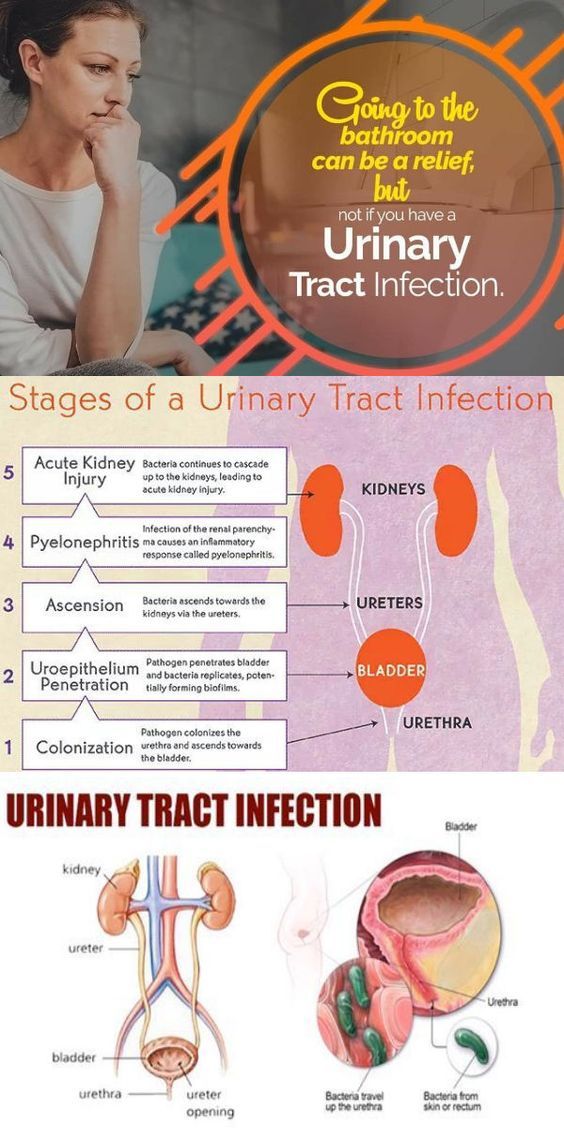 The most important thing is to speak with your doctor in a timely manner if you’re experiencing any pain, so they can ensure both you and baby stay healthy.
The most important thing is to speak with your doctor in a timely manner if you’re experiencing any pain, so they can ensure both you and baby stay healthy.
About the experts:
Sarah Prager, MD, MAS, is a professor in the department of obstetrics and gynecology at the University of Washington and director of the family planning division. She received her medical degree from the University of Texas Southwestern Medical School in 2000 and completed an internship and residency at the University of Vermont.
Alan Fishman, MD, is the medical director for Obstetrix Medical Group of San Jose in Campbell, California, and is double board-certified in obstetrics and gynecology, as well as maternal-fetal medicine. He received his medical degree from Jefferson Medical College in Philadelphia, Pennsylvania, and completed his ob-gyn residency and maternal-fetal medicine fellowship program at University of Southern California, School of Medicine in Los Angeles.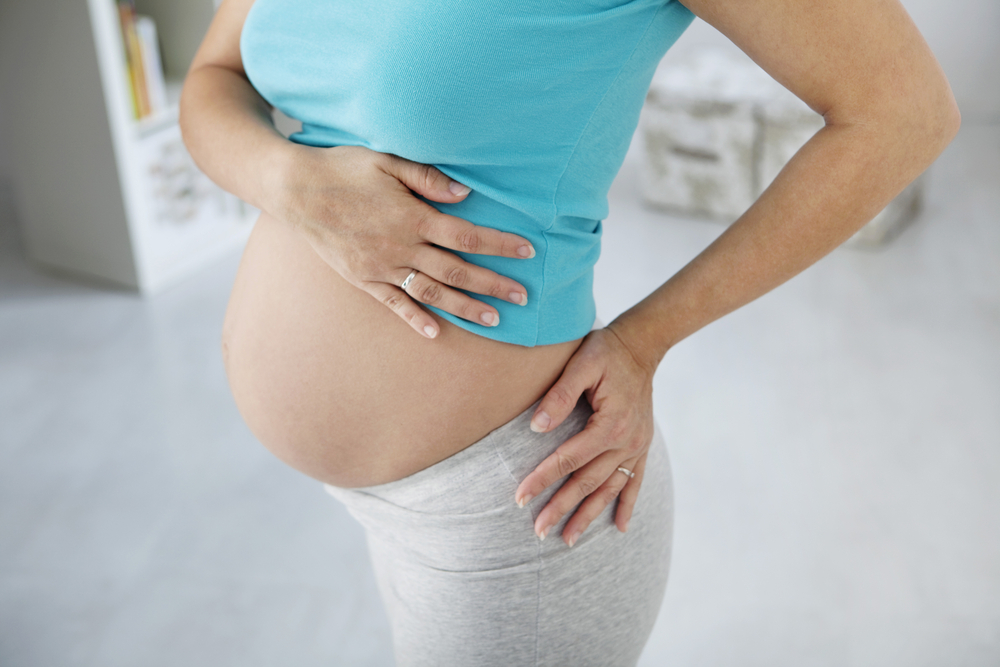
Brittany Robles, MD, MPH, CPT, is an ob-gyn and NASM-certified personal trainer who runs PostpartumTrainer.com, a pregnancy and postpartum health and fitness site. She earned her medical degree from Ross University School of Medicine and received her master’s degree in global health from Icahn School of Medicine at Mount Sinai.
Please note: The Bump and the materials and information it contains are not intended to, and do not constitute, medical or other health advice or diagnosis and should not be used as such. You should always consult with a qualified physician or health professional about your specific circumstances.
Plus, more from The Bump:
Is It Normal to Have Dark Urine During Pregnancy?
What Round Ligament Pain Feels Like—and How to Find Relief
Why You’re So Thirsty During Pregnancy
Cystitis during pregnancy: description of the disease, causes, symptoms, diagnosis and treatment
What not to do with cystitis in early pregnancy
1. Take antibiotics unless prescribed by a doctor. Self-medication can lead to the development of fetal abnormalities. It is especially forbidden to take tetracycline, ofloxacin, norfloxacin, aminoglycosides.
Take antibiotics unless prescribed by a doctor. Self-medication can lead to the development of fetal abnormalities. It is especially forbidden to take tetracycline, ofloxacin, norfloxacin, aminoglycosides.
2. Carrying out instillations. This procedure, during which an antibacterial drug is injected into the bladder, can cause an early miscarriage.
3. You can not take non-steroidal anti-inflammatory drugs. This refers to the intake of nimesil, diclofenac, analgin, etc. Otherwise, the unborn child may experience severe pathologies.
4. Do not carry out physiotherapy procedures, so as not to provoke a miscarriage.
5. Do not take a hot bath, do not visit the sauna, bath. Avoid overheating to avoid uterine hypertonicity.
How does cystitis manifest during pregnancy?0003
The inflammatory process in the bladder in a pregnant woman is manifested:
-
Frequent urination. This symptom does not always signal the appearance of cystitis.
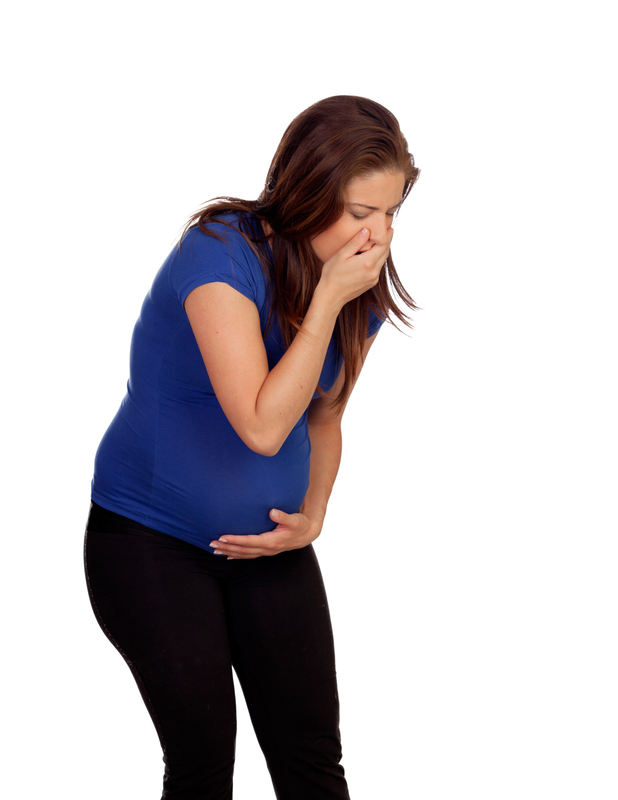 This is normal during pregnancy.
This is normal during pregnancy. -
The appearance of itching and burning in the urethra. An increase in these symptoms is observed after urine has begun to stand out.
-
There is always a feeling that the bladder has not completely emptied.
-
False claims appear. The pregnant woman is in dire need of going to the toilet, but there is no urine output.
-
The stomach hurts, heaviness is felt in the lower part of the abdomen.
-
The color of the urine changes. It is cloudy, reddish in color. This is due to blood impurities.
-
After emptying the bladder, urine still leaks. The spread of the inflammatory process occurred on the sphincter. In this case, there was a violation of its functioning.
-
A woman observes that a purulent and mucous secretion has begun to be released from the urethra.
-
body intoxication. General weakness appears, the head often hurts, body temperature rises, there is no appetite.

Features of the treatment of cystitis in the later stages
Treatment of the disease in the third trimester of pregnancy is very similar to early treatment. However, there is a decrease in the risk of developing pathologies in the unborn child if the gestational age is more than 24 weeks.
At this time, the formation of the main organs, tissues and systems has already taken place. They just mature and develop. But at this stage of pregnancy, the likelihood of developing cystitis increases, which is dangerous for both the child and the pregnant woman with its complications.
Those medicines and procedures that were prohibited at an early date may be prescribed at a later date. It must be remembered that only the attending physician can prescribe this. It takes into account all the risks of treatment for the expectant mother and her child.
Exemplary regimen for the treatment of disease in late pregnancy
1. Appointment of antibiotic therapy. They can prescribe amoxicillin, suprax, monural. If the disease is more severe, the doctor prescribes penicillins, macrolipids, and other cephalosporins.
They can prescribe amoxicillin, suprax, monural. If the disease is more severe, the doctor prescribes penicillins, macrolipids, and other cephalosporins.
2. Instillation is carried out. During the procedure, an antibacterial and anti-inflammatory drug is injected into the bladder. This method can be carried out only in late pregnancy and only in the chronic form of the disease. The procedure is carried out in a hospital.
3. Herbal preparations (canephron, urolesan, cystone) are prescribed.
4. Treatment with antispasmodics.
5. Use of physiotherapy. Pregnant women may be prescribed electrophoresis or galvanophoresis with no-shpa or papaverine, calcium chloride, acetylsalicylic acid, antiseptic and antibiotic. These methods are indicated up to 34 weeks of pregnancy. Physiotherapy is in most cases prescribed for chronic cystitis. Contraindication is increased uterine tone, bleeding, preeclampsia, etc.
6. The use of immunostimulating drugs (flavozid or viferon).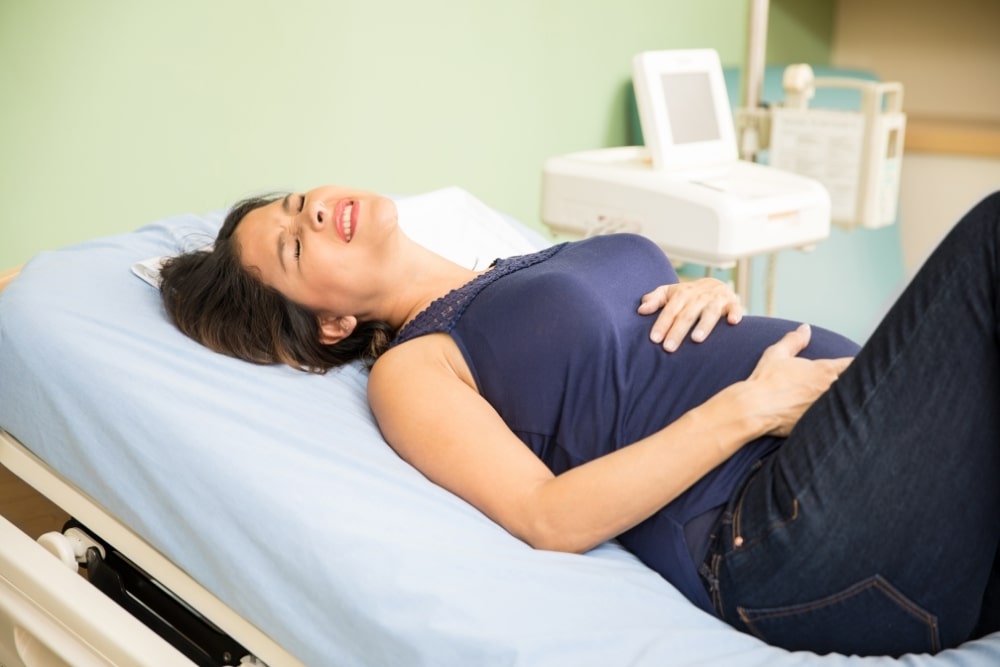
It should be remembered that any therapeutic measures should be prescribed exclusively by a qualified and experienced specialist. With any attempt at self-treatment, the most deplorable consequences for the unborn child can occur.
Types of cystitis during pregnancy
Cystitis in early pregnancy can have a different etiology. This means that there is no single method of treating pathology. Drawing up a treatment regimen and prescribing drugs depends on the results of the diagnosis. The disease may be:
-
Hemorrhagic. The provoking factor is an infectious agent. They mean Escherichia or Pseudomonas aeruginosa, enterobacteria, streptococci. This is the most common form of cystitis. In such a situation, treatment with an antibacterial drug is necessary. The choice of the drug is carried out strictly by the attending physician, since the intake of certain drugs is prohibited in the first trimester of pregnancy.
-
Interstitial.
 This type of cystitis is characterized by a non-infectious inflammatory process, that is, the cause of the disease is an allergen or medication. To eliminate this form of the disease, an antibiotic is not prescribed. For the treatment of interstitial cystitis, a pregnant woman is shown taking anti-inflammatory, sedative and analgesic drugs.
This type of cystitis is characterized by a non-infectious inflammatory process, that is, the cause of the disease is an allergen or medication. To eliminate this form of the disease, an antibiotic is not prescribed. For the treatment of interstitial cystitis, a pregnant woman is shown taking anti-inflammatory, sedative and analgesic drugs. -
Luchev. Refers to a rarer occurrence during pregnancy. This is explained by the fact that the conduct of radiation therapy to a woman is prohibited during the bearing of a child. For the treatment of this form of cystitis, antispasmodics, sedatives and drugs are prescribed that help accelerate regenerative processes.
-
Sexual. An exacerbation of this form of cystitis during pregnancy occurs due to prior infection. Strengthening of the symptoms of the disease is observed after sexual intercourse, if there are no barrier means of protection. This can be easily explained. After intimacy, the microflora changes.
 If pathogenic or conditionally pathogenic microorganisms have entered the urethra, a woman will notice the appearance of signs of cystitis. Genital inflammation of the bladder needs to take antiseptics, sedatives, diuretics.
If pathogenic or conditionally pathogenic microorganisms have entered the urethra, a woman will notice the appearance of signs of cystitis. Genital inflammation of the bladder needs to take antiseptics, sedatives, diuretics.
Why does cystitis appear
The development of cystitis during pregnancy occurs under the influence of several factors. An important point is the timely determination of the causes that led to the appearance of cystitis. This is necessary so that the doctor can prescribe effective treatment and draw up a list of medical recommendations that will help the pregnant woman avoid a relapse of the disease. Also, it helps to prevent the transition of the disease into a chronic form.
There are a number of factors that lead to cystitis:
-
Promiscuous sexual intercourse. The likelihood of infection during sexual contact increases, since the urethra and vagina are located in close proximity. It should be borne in mind that the penetration of infection into the urinary tract can occur, both from the mucous membrane of the vagina and the external genital organ of a woman.

-
Neglect of hygiene rules. It is necessary to wash the external genital organs daily, to wash after intimacy, to change underwear in a timely manner, to use daily pads. All this helps to reduce the likelihood of infection entering the urinary tract of a woman.
-
Prolonged presence of dysbacteriosis or vaginal candidiasis. If the vaginal microflora is disturbed, pathogenic microorganisms multiply much faster. This can cause an inflammatory response.
-
Impaired immunity. If immunity is lowered or allergic local pathologies are present, a significant decrease in the protective properties of the body occurs. As a result, pathogenic or opportunistic microorganisms enter the bladder without any obstacles.
-
With infrequent urination. It is normal for a woman to empty her bladder at least 4 times a day. During pregnancy, this figure increases. There are various reasons why a timely trip to the toilet is not possible.
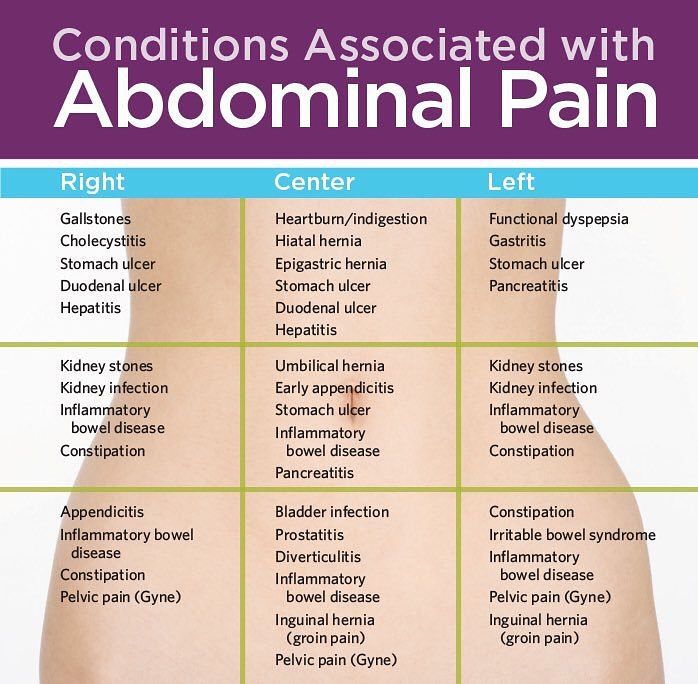 And if it becomes regular, the structure of the urethra and the sphincter anatomically change. As a result of such changes, the normal emptying of the bladder is disrupted. In addition, if urine is in the bladder for a long time, optimal conditions are created for infectious development.
And if it becomes regular, the structure of the urethra and the sphincter anatomically change. As a result of such changes, the normal emptying of the bladder is disrupted. In addition, if urine is in the bladder for a long time, optimal conditions are created for infectious development. -
With regular hypothermia. If the body of a pregnant woman is often supercooled, its local protective properties are weakened, as a result of this, the likelihood of unhindered penetration of the infection into the bladder increases. Damaging factors contribute to the development of an inflammatory reaction in the walls of the bladder, as a result - the appearance of signs of cystitis.
All causes of cystitis are divided into infectious and non-infectious. There are four routes of bladder infection:
1. Descending - the penetration of the infection occurs from the inflamed organ, that is, the kidney.
2. Ascending - the initial localization of the infection that has entered the bladder is the external environment.
3. Lymphogenic - lymphatic vessels are involved in the movement of the infection. Basically, the focus of infection in the inflamed genital organ.
4. Hematogenous - the spread of infection occurs through the bloodstream from a distant purulent focus.
Non-infectious causes of cystitis:
-
An allergic reaction, which manifests itself in the form of an inflammatory process of the mucous membrane of the bladder.
-
Disturbed work of the immune system, nervous system.
-
If the lower abdomen or pubis is undergoing radiation therapy.
There are factors in the presence of which increases the likelihood of developing cystitis. This happens when:
-
regular hypothermia of the body.
-
Constant use of tight underwear.
-
Non-compliance with hygiene rules.
-
Chronic disease of one or another internal organ.
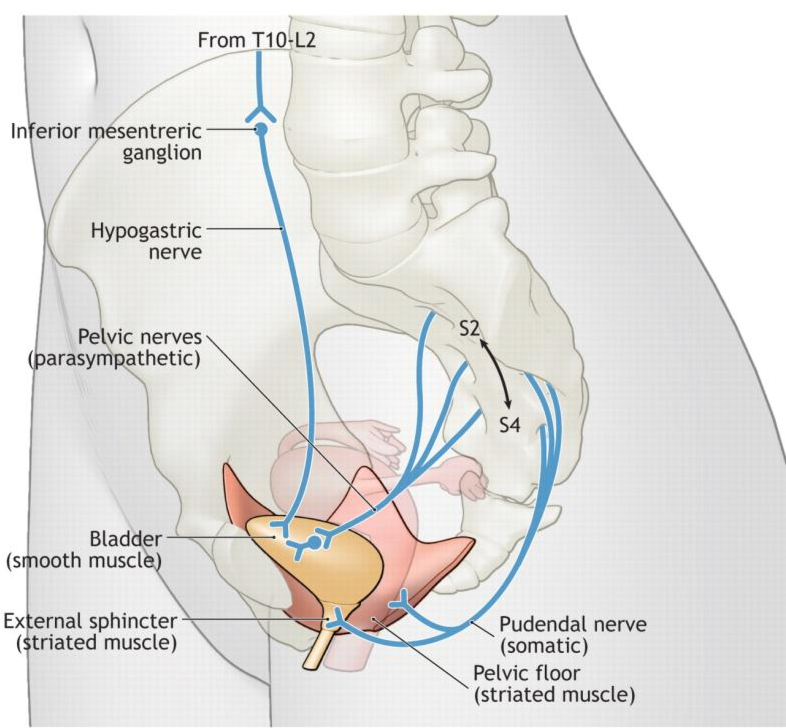
-
Overwork, hypovitaminosis.
-
Impaired emptying of the bladder.
-
Reduced protective functions of the body.
-
The presence of a foreign body that is located in the bladder.
Despite the fact that the most common cause of cystitis is a bacterial infection, the inflammatory process in the bladder can begin due to some non-infectious factors.
Under the influence of certain drugs, especially chemotherapy drugs, an inflammatory process in the bladder can begin. The cause of drug cystitis is the excretion of the decay products of medicines from the body.
With prolonged use of the catheter, there is an increase in susceptibility to bacterial infection. As a result, the likelihood of an inflammatory process increases. This is called foreign body cystitis.
Some women may be hypersensitive to a particular substance found in personal care or household products. They mean bath foam, feminine hygiene spray, spermicidal gel. In some situations, the inflammatory process is a consequence of the reaction of the body - allergies.
They mean bath foam, feminine hygiene spray, spermicidal gel. In some situations, the inflammatory process is a consequence of the reaction of the body - allergies.
Diagnostic measures
If any signs of cystitis appear, a woman should immediately consult a doctor. At the appointment, the patient is asked about how long ago she noticed the onset of symptoms, whether this happened before, and also what diseases were previously transferred and are present now. The patient must truthfully answer the questions. Otherwise, the doctor will not get a complete picture of what is happening to her.
To detect cystitis, the doctor sends for a laboratory examination. It consists in the delivery of a general analysis of blood and urine. Thanks to such studies, it is possible to detect inflammation, the level of leukocytes and the immature form of neutrophils, the level of erythrocyte sedimentation rate. In addition, protein in the urine, bacteria are detected. If the result of a general urinalysis showed that the content of leukocytes is increased, the patient is prescribed a urine test according to Nechiporenko.
Conducting such a urine test will help determine what was the causative agent of the disease. As a result, more effective treatment is prescribed. With this method of examination, an antibiogram can be performed and the sensitivity of the pathogen to various types of antibacterial drugs can be determined.
Also, special test strips are used, thanks to which nitrites and leukocytes are determined. Such special strips give a reaction if the products of the activity of pathogenic microorganisms are present in the urine.
Ultrasound examination of the bladder helps to exclude stones in the organ, and also, the doctor assesses the condition of the upper urinary tract and the organs adjacent to the bladder. Ultrasound will allow to exclude a volumetric neoplasm.
How to prevent the development of cystitis
There are a number of recommendations, subject to which the likelihood of developing the disease decreases.
1. It is necessary to wash every day once a day. For these purposes, use soap, preferably for children. It does not contain fragrances and dyes.
For these purposes, use soap, preferably for children. It does not contain fragrances and dyes.
2. Carefully monitor that the sexual partner observes the basic rules of personal hygiene. He must wash the external genitalia every day.
3. Before and after sexual intercourse, you should thoroughly wash yourself. Use soap. This rule must be respected by both sexual partners.
4. With stomatitis, tonsillitis, oral candidiasis and other infections, it is not recommended to have oral sex. This rule is easy to explain - with saliva, the infection is transmitted to the external genital organs, and then to the urethra.
5. Always dress for the weather. Hypothermia can cause chronic recurrent cystitis. It should be noted that cystitis is not the most terrible pathology that hypothermia can cause. In addition to cystitis, an inflammatory process develops in nearby organs, which can provoke a miscarriage.
6. Keep track of the state of your own immunity. If a woman often has a cold, it can be judged that the work of the immune system is reduced. To restore it, you need to contact a qualified specialist.
If a woman often has a cold, it can be judged that the work of the immune system is reduced. To restore it, you need to contact a qualified specialist.
7. Try as much as possible not to hold back urination. With prolonged retention of urine in the bladder, an infection develops.
8. Drink enough fluids.
9. A man should change his underwear every day. Thanks to this rule, the risk of developing the disease is minimized.
10. After emptying the bowels, wipe from front to back. By no means the other way around. This tactic is easy to explain - if you wipe from back to front, you can transfer intestinal bacteria to the external genitalia. After that, pathogenic microorganisms will reach the urethra.
11. During an exacerbation of the disease, the patient should take about 2.5 liters of fluid per day. It can be both water and fresh natural juices, cranberry juice. Carbonated water and artificial drinks should be excluded from the diet.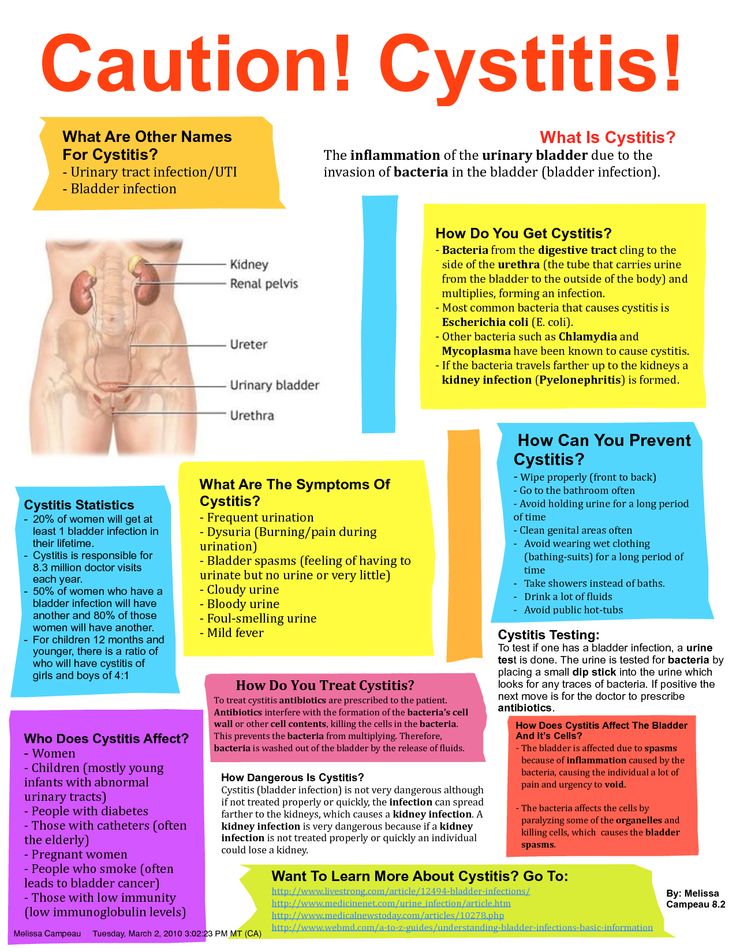
12. Do not wear tight synthetic underwear.
13. Avoid frequent constipation.
In any case, it is necessary to consult with a qualified specialist who will tell you how a woman should behave during pregnancy. If you do not visit a doctor with symptoms of cystitis, this threatens with dangerous complications not only for the expectant mother, but also for the child, up to the death of the fetus.
Urinary tract infections vs pregnancy: treatment and prevention
Resume. Urinary tract infections are one of the most common complications in pregnant women, which can lead to serious consequences not only for the expectant mother, but also for the child. When managing pregnant women with diseases of the urinary system, it is extremely important to choose the right and, most importantly, safe therapeutic tactics. What drugs are safe during pregnancy? What obstetric and therapeutic tactics are most effective for kidney diseases in pregnant women? What diagnostic methods are best used for asymptomatic bacteriuria, acute cystitis and pyelonephritis? Professor 9 spoke about this in her speech0107 Olga Grishchenko , Head of the Department of Perinatology, Obstetrics and Gynecology of the Kharkiv Medical Academy of Postgraduate Education during the training workshop for gynecologists "Actual Guidelines of Gynecology, Reproductology, Obstetrics", held on March 29, 2019 in Kharkiv.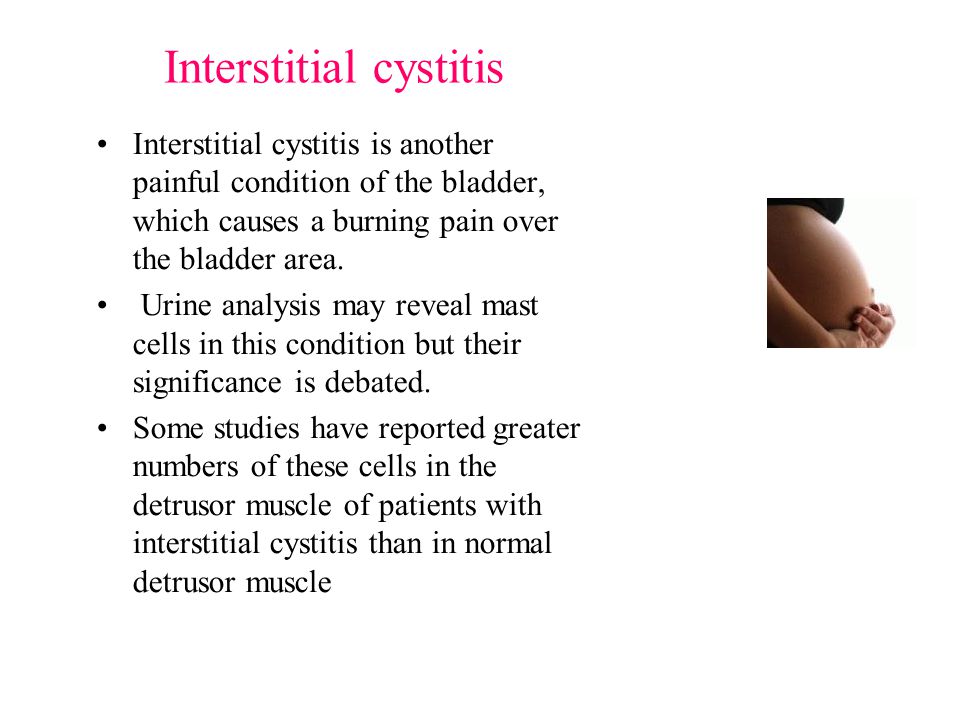 The event was organized by the MedExpert Group of Companies together with the National Medical University named after A.A. Bogomolets and National Medical Academy of Postgraduate Education named after P.L. Shupyk.
The event was organized by the MedExpert Group of Companies together with the National Medical University named after A.A. Bogomolets and National Medical Academy of Postgraduate Education named after P.L. Shupyk.
Urgency of the problem
Urinary tract infections (UTIs) are the most common bacterial infections in outpatient practice, they take the 2nd place, second only to respiratory tract infections. According to statistics, 50% of women in the world have an episode of UTI at least once in their lives, of which 25–40% experience a relapse of the disease within 6–12 months. Every year, about 10% of women develop acute cystitis, and pyelonephritis remains the leading cause of hospitalization during pregnancy for non-obstetric indications.
In the presence of UTIs in pregnant women, the risk of preterm labor and rupture of amniotic fluid, chorioamnionitis increases, premature or functionally immature children are born, and the level of perinatal mortality increases.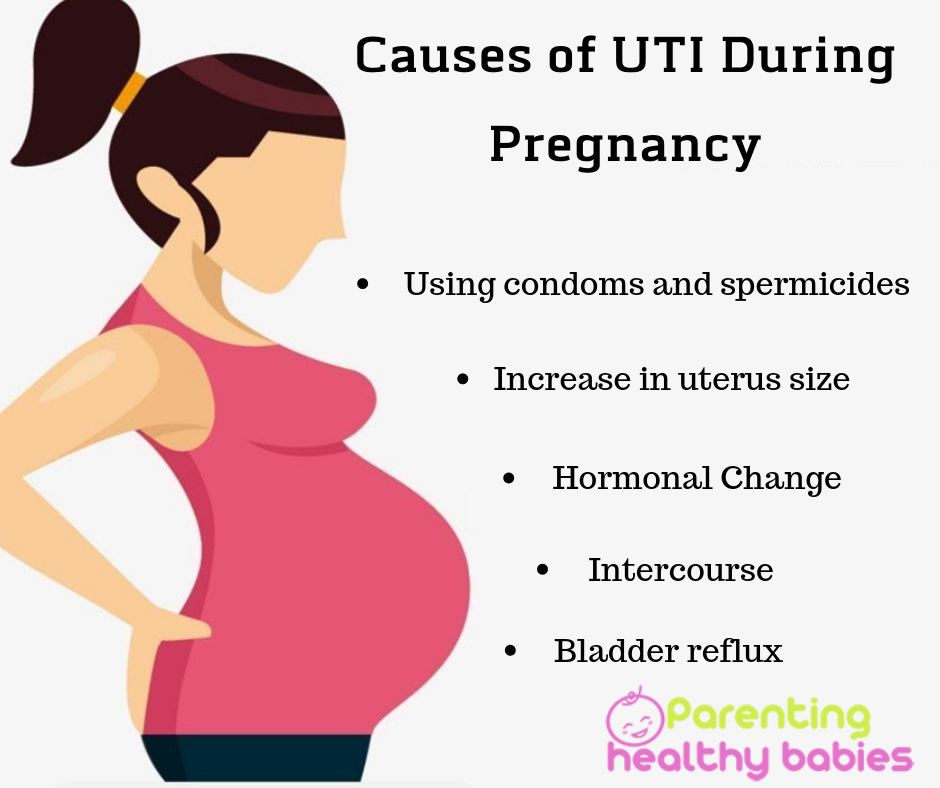
In the structure of UTI, asymptomatic bacteriuria is observed in 4-9.5% of pregnant women, acute pyelonephritis - in 12-25%, chronic pyelonephritis - in 33%, glomerulonephritis, urolithiasis - in 0.1-0.2%.
Risk factors and pregnancy
As a rule, infections, self-medication or improper treatment, asymptomatic bacteriuria, frequent UTIs in combination with inflammatory diseases (colpitis), lifestyle and nutrition can affect the occurrence of pathology of the urinary system.
Pregnant women have an increased risk of diseases of the urogenital tract. A high level of progesterone leads to the development of hypotension, hypokinesia, dyskinesia of the ureters and pyelocaliceal system. In turn, the uterus compresses the ureter, high intra-abdominal pressure occurs, especially in primiparas. During pregnancy, the renal pelvis enlarges, the growing uterus squeezes the ureter more and more, the outflow of urine from the kidneys becomes difficult, the urine stagnates, bacteria multiply in it, and inflammation easily occurs.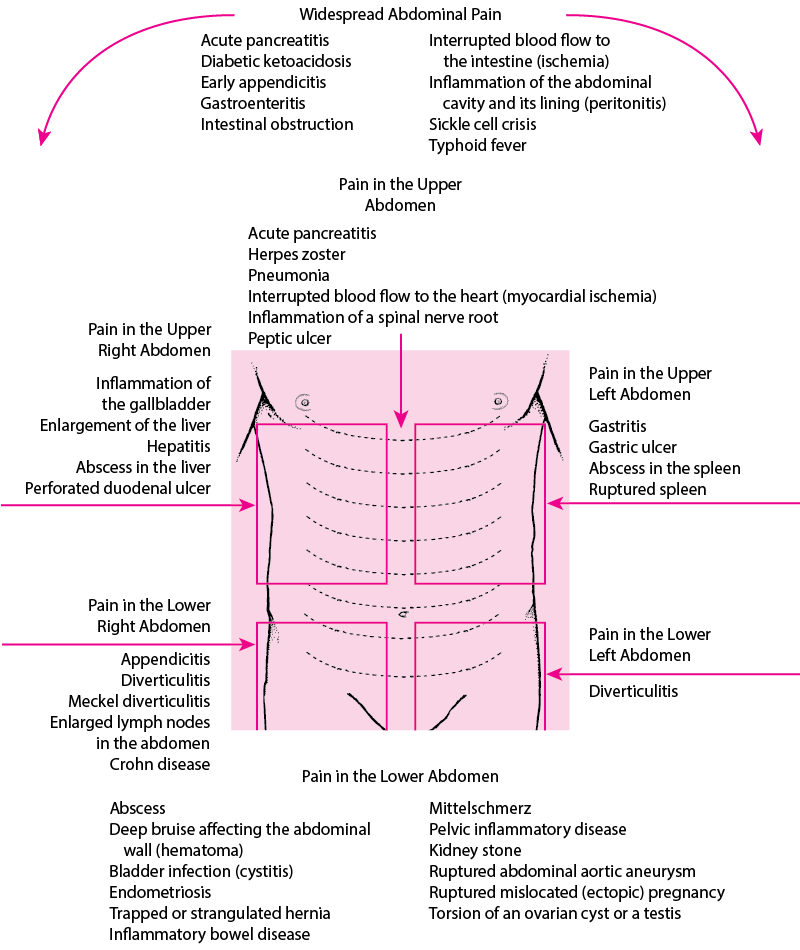
Infectious agents can enter the bladder by ascending (with inflammatory diseases of the urethra), descending (most often with tuberculous kidney damage), hematogenous (if there is a purulent focus in other parts of the body) and lymphogenic (with diseases of the genital organs) by.
Classification of UTIs in pregnant women
UTIs in pregnant women include asymptomatic bacteriuria, lower urinary tract infections (acute and recurrent cystitis) and upper urinary tract infections (acute pyelonephritis, chronic pyelonephritis in remission, exacerbation, latent course).
Cystitis in pregnancy: course, diagnosis
Cystitis is an inflammation of the bladder wall, one of the most common urological diseases, as a rule, its cause is an infection. Symptoms of cystitis in women are manifested in the form of frequent urination, cramps and pain when urinating, pulling sensations in the lower abdomen, weakness, fatigue, irritability, blood in the urine, cloudy urine, pus or yellow spots on the underwear.
Normally, urination is not accompanied by pain. In women, painful urination can be caused by diseases of the bladder, urethra, or vagina. So, pain in the bladder, as a rule, is felt in the area of the womb, it can increase during urination or, conversely, decrease when the bladder is empty. Urethral pain associated with urination is felt by the patient directly in the urethra and is usually aggravated by urination. Urine entering the vaginal opening can cause pain if it is inflamed. Inflammation of the urethra is most often characterized by a bacterial nature and requires additional examination and treatment.
Primary diagnosis of cystitis involves an examination by specialized specialists (urologist, nephrologist, gynecologist), as well as taking an anamnesis and establishing possible causes of the disease (hypothermia, unprotected intercourse, taking medications, the presence of concomitant diseases).
Laboratory tests include a urinalysis for Nechiporenko cultures (helps identify the pathogen), a general urinalysis (allows you to identify erythrocytes, leukocytes, protein in the urine; the urine itself may be cloudy with an admixture of blood or pus), a general blood test (allows you to identify a picture inflammatory process, it is possible to increase the erythrocyte sedimentation rate (ESR), leukocytosis).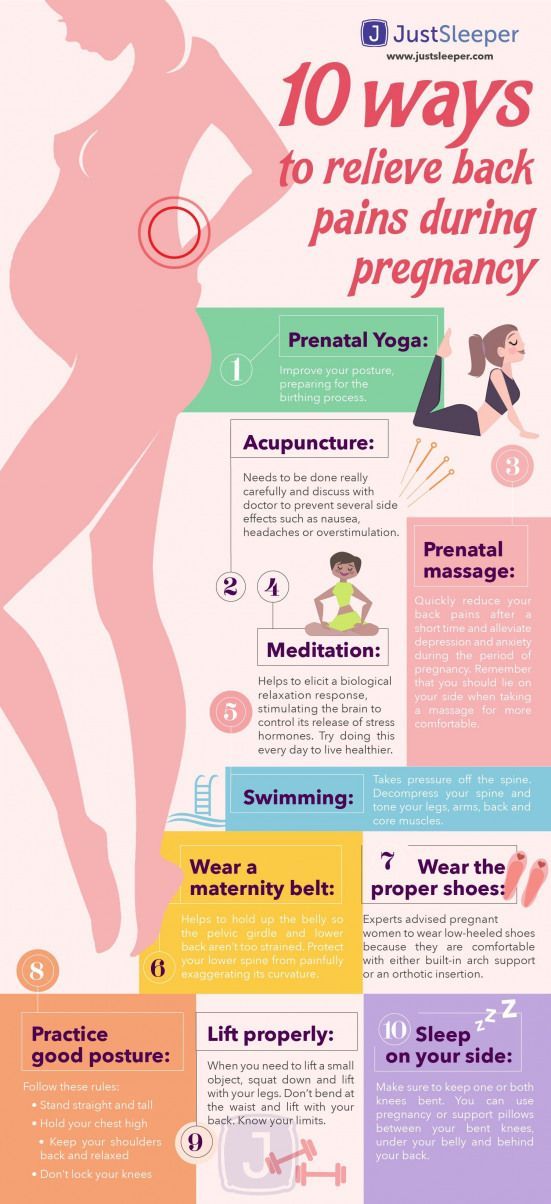 Among instrumental methods, ultrasound examination (ultrasound) of the bladder, ureteroscopy and cystoscopy (in case of violation of the passage of urine) are used.
Among instrumental methods, ultrasound examination (ultrasound) of the bladder, ureteroscopy and cystoscopy (in case of violation of the passage of urine) are used.
Asymptomatic bacteriuria during pregnancy
Asymptomatic bacteriuria during pregnancy is dangerous for both mother and fetus, against its background, 25% of women develop acute pyelonephritis. According to the World Health Organization, about 8% of women report asymptomatic bacteriuria, 15-57% of women with untreated asymptomatic bacteriuria develop symptoms of a UTI (acute cystitis or pyelonephritis). Therapy of this disease during pregnancy reduces the risk of developing acute UTIs, preterm birth, and low birth weight.
Diagnosis of asymptomatic bacteriuria can be established by detecting 10 5 CFU/ml of one strain of bacteria or 10 2 CFU/ml of uropathogen Escherichia coli in 2 urine samples taken from leukocytes containing > 4 h field of view in the absence of clinical manifestations of UTI.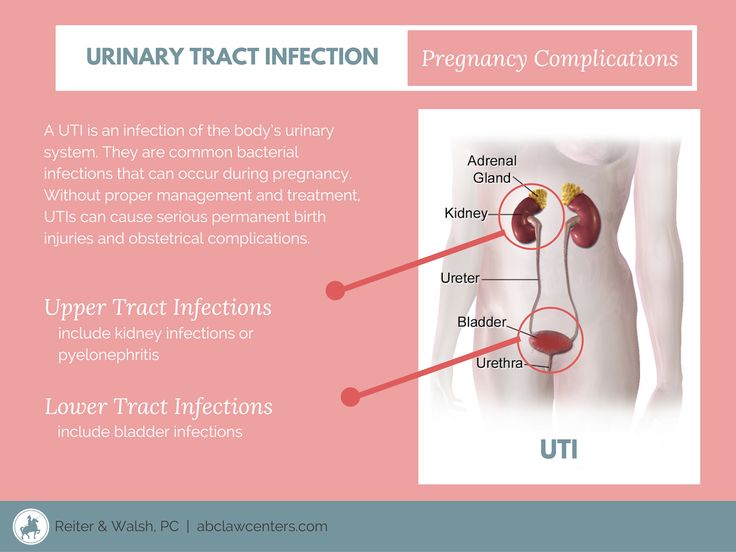
It should be remembered that the risk of this pathology is most real from the 9th to the 17th week of pregnancy. The only reliable method for diagnosing asymptomatic bacteriuria is the method of urine culture.
In accordance with Ukrainian and international recommendations for asymptomatic bacteriuria, oral antibiotic therapy with a single dose of fosfomycin trometamol is recommended.
Pyelonephritis: diagnosis
Pyelonephritis is an infectious and inflammatory disease of the kidneys of bacterial etiology with a primary and predominant lesion of the interstitium and tubular apparatus. The incidence of pyelonephritis during pregnancy reaches 33%, mortality - 3.5%, maternal mortality from kidney disease in the structure of extragenital pathology is 8-10%, the incidence of gestational pyelonephritis is 11.5%.
Primary pyelonephritis in pregnant women is difficult to treat, may be accompanied by fever, chills, nausea, vomiting, pain in the lumbar region, the appearance of pyuria, bacteriuria. As a rule, the right kidney is affected more often than the left one, with expansion of the pelvicalyceal system (according to ultrasound).
As a rule, the right kidney is affected more often than the left one, with expansion of the pelvicalyceal system (according to ultrasound).
In acute pyelonephritis, the mandatory research methods are a general urinalysis (in 2 portions) 1 time in 7 days, a Nechiporenko urinalysis, a general and biochemical blood test, a bacteriological urinalysis, ultrasound of the kidneys and bladder, daily proteinuria, a biochemical blood test , blood pressure monitoring, urologist consultation. Additional research methods - computed tomography without contrast or excretory urogram, nuclear magnetic resonance imaging - are carried out exclusively for strict, sometimes vital, indications.
It should be remembered that dysuria in primary acute cystitis with a body temperature of 38 ° C and chills may indicate acute ascending pyelonephritis. A sharp dysuric syndrome is characteristic of the associated cystitis during exacerbation of chronic pyelonephritis. Urinary syndrome (proteinuria, leukocyturia, hematuria, etc. ) may periodically disappear with a unilateral process and ureter occlusion; therefore, serial urine tests are necessary. The degree of leukocyturia does not always correspond to the severity of the inflammatory process. A single urine culture gives at least 20% false positive results. Bacteriuria appears and can be detected 2 days earlier than pyuria.
) may periodically disappear with a unilateral process and ureter occlusion; therefore, serial urine tests are necessary. The degree of leukocyturia does not always correspond to the severity of the inflammatory process. A single urine culture gives at least 20% false positive results. Bacteriuria appears and can be detected 2 days earlier than pyuria.
Choice of drugs for the treatment of pregnant women with UTIs
There are certain requirements for antibiotics for the treatment of UTIs in pregnant women. In particular, they must be effective against most pathogenic pathogens, have the ability to create a high concentration in organs - foci of infection, have a long half-life sufficient to maintain a high concentration of the antibiotic in the blood, not have toxic and allergic effects, be well tolerated by patients, be harmless to mother and fetus.
It has been shown that it is advisable to use antibacterial uroseptics for the treatment of pregnant women with acute cystitis, asymptomatic bacteriuria, acute pyelonephritis.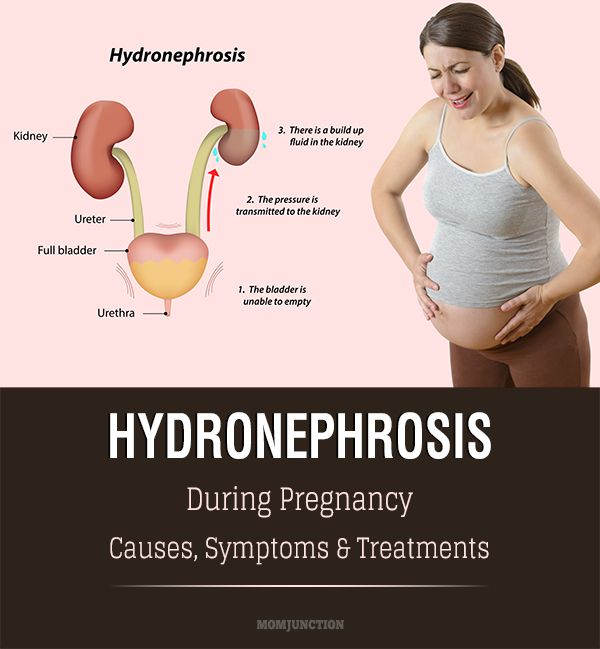 In particular, fosfomycin trometamol has a bactericidal effect associated with blocking the bacterial enzyme involved in the synthesis of the cell wall, as well as an anti-adhesive effect (destroys the fimbria of Escherichia coli, preventing it from fixing on the wall of the urothelium and promoting leaching from the urinary tract). After a single dose of the drug, the therapeutic concentration is observed for 48 hours (this is enough to sterilize urine and recover).
In particular, fosfomycin trometamol has a bactericidal effect associated with blocking the bacterial enzyme involved in the synthesis of the cell wall, as well as an anti-adhesive effect (destroys the fimbria of Escherichia coli, preventing it from fixing on the wall of the urothelium and promoting leaching from the urinary tract). After a single dose of the drug, the therapeutic concentration is observed for 48 hours (this is enough to sterilize urine and recover).
An alternative to antibiotics are phytoneering preparations with anti-adhesive and antibacterial activity, as well as anti-inflammatory, antispasmodic, nephroprotective properties.
Organization of care for pregnant women with UTI and prevention
Delivery of pregnant women with UTI (without obstetric pathology) is carried out through the natural birth canal, taking into account the obstetric situation.
There are degrees of risk of pyelonephritis:
- I degree - uncomplicated pyelonephritis that occurred during pregnancy;
- II degree - chronic uncomplicated pyelonephritis, noted before pregnancy;
- III degree - pyelonephritis with hypertension, azotemia, pyelonephritis of a single kidney.



